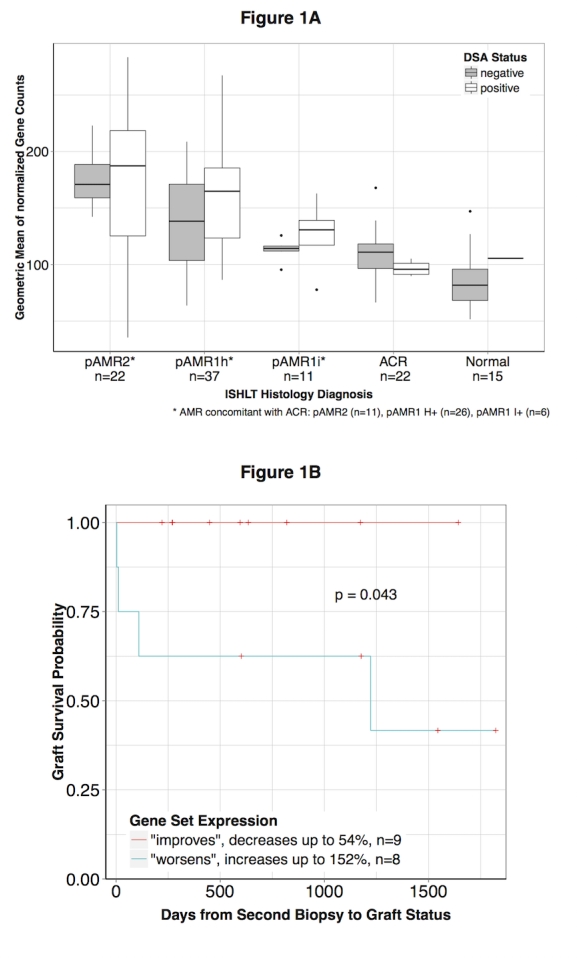Molecular Testing for Microcirculation Injury Enhances the Assessment of Antibody-Mediated Rejection in Human Cardiac Allograft Biopsies
1Dept. of Laboratory Medicine and Pathology, University of Alberta, Edmonton, AB, Canada
2Div. of Cardiology, University of Alberta, Edmonton, AB, Canada.
Meeting: 2015 American Transplant Congress
Abstract number: B273
Keywords: Antibodies, Graft survival, Heart transplant patients, Rejection
Session Information
Session Name: Poster Session B: Translational Genetics and Proteomics in Transplantation
Session Type: Poster Session
Date: Sunday, May 3, 2015
Session Time: 5:30pm-6:30pm
 Presentation Time: 5:30pm-6:30pm
Presentation Time: 5:30pm-6:30pm
Location: Exhibit Hall E
BACKGROUND: Despite continuous attempts to refine diagnostic consensus, accurate assessment of Antibody-mediated rejection (AMR) is an ongoing unmet need. The microcirculation represents the primary target for donor-specific, anti HLA antibodies (DSA), accordingly increased expression of endothelial, NK cell and inflammatory genes has been associated with AMR. Here we evaluate a respective gene set for diagnosing AMR in formalin-fixed, paraffin-embedded (FFPE) human cardiac graft biopsies.
METHODS: 107 archival FFPE biopsies were classified according to 2013 ISHLT consensus. A set of 34 endothelial, NK cell and inflammatory genes was quantified with NanoString nCounter system.
RESULTS: In 70 AMR cases gene set expression was significantly higher compared to 22 ACR (p<0.0001) and 15 control cases (p<0.0001). Overall presence of DSA was associated with higher gene set expression (p=0.001). In the presence of DSA AMR cases tended to higher gene expression but this did not meet statistical significance (p=0.065), whereas in ACR presence of DSA did not result in higher expression (Figure 1A). C4d deposition showed borderline association with higher expression levels (p=0.052). Significant higher expression were found between pAMR2 and pAMR1H+ compared to ACR and controls. In ROC analysis the gene set had higher diagnostic accuracy (AUC=78.61) for discriminating AMR from ACR and controls than DSA (AUC=72.55) or C4d (AUC=70.71). In 17 patients with sequential biopsies increasing gene set expression over the course of AMR was associated with allograft failure (Figure 1B). 
CONCLUSION: Molecular diagnostics in FFPE allograft biopsies is feasible as routine diagnostic work-up. Molecular grading of antibody-mediated tissue injury can add diagnostic and prognostic value to assessing cardiac allograft biopsies.
To cite this abstract in AMA style:
Afzali B, Chapman E, Adam B, Gil FRiesgo, Kim D, Hidalgo L, Campbell P, Sis B, Mengel M. Molecular Testing for Microcirculation Injury Enhances the Assessment of Antibody-Mediated Rejection in Human Cardiac Allograft Biopsies [abstract]. Am J Transplant. 2015; 15 (suppl 3). https://atcmeetingabstracts.com/abstract/molecular-testing-for-microcirculation-injury-enhances-the-assessment-of-antibody-mediated-rejection-in-human-cardiac-allograft-biopsies/. Accessed February 21, 2026.« Back to 2015 American Transplant Congress
